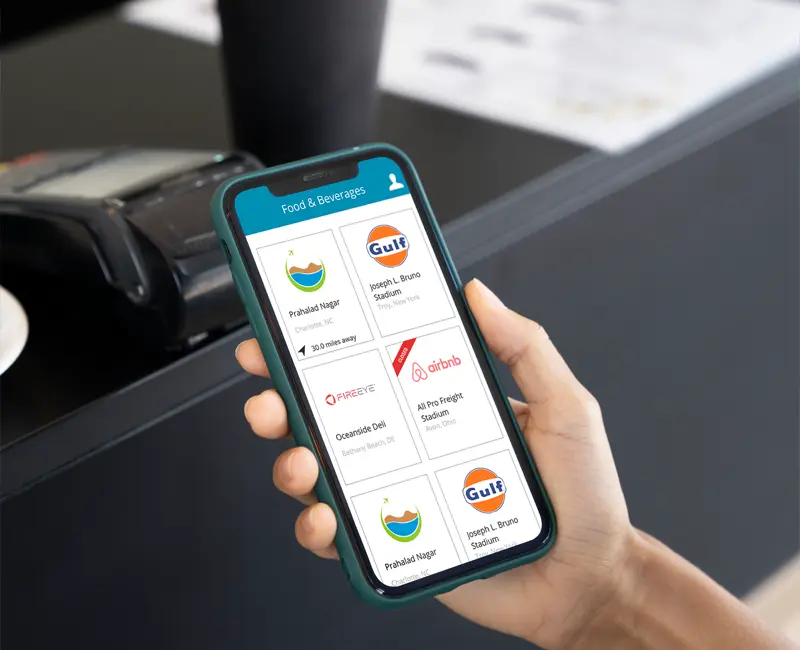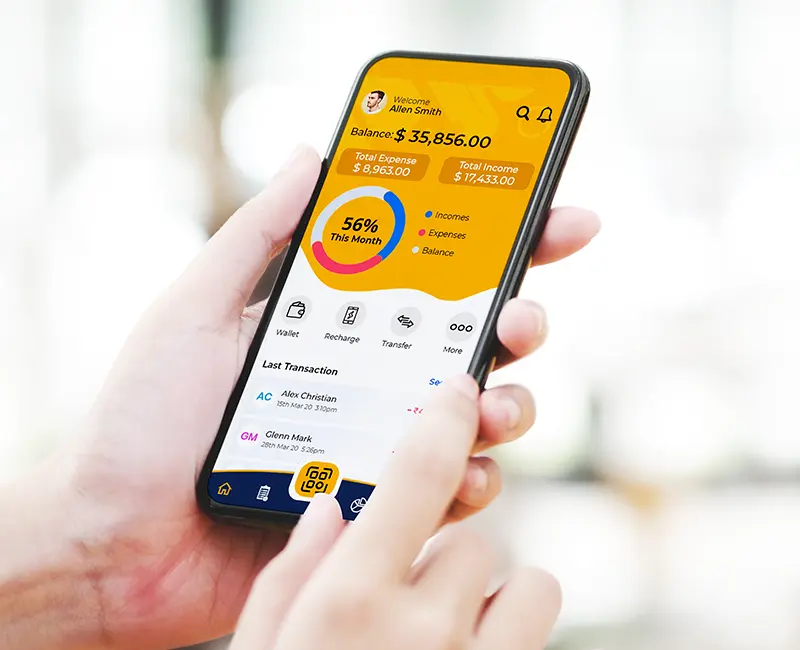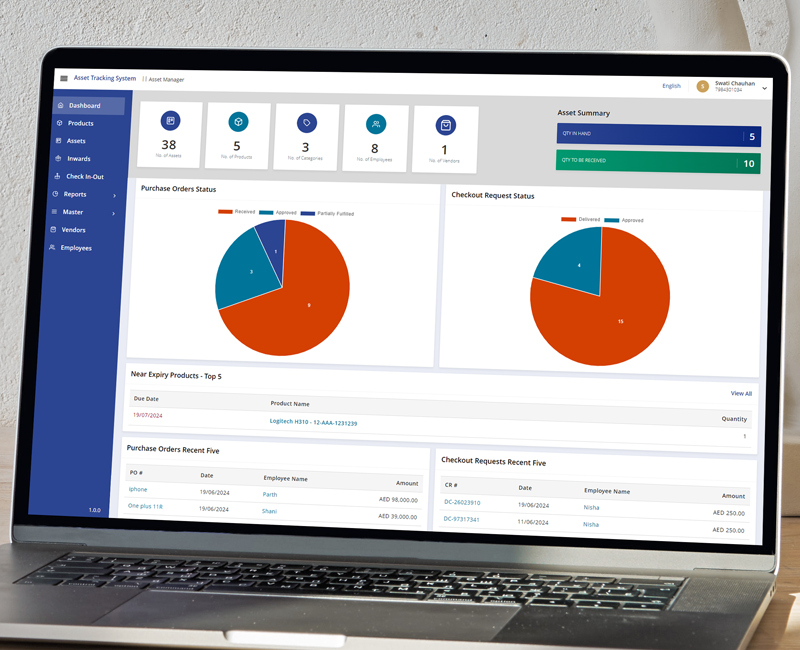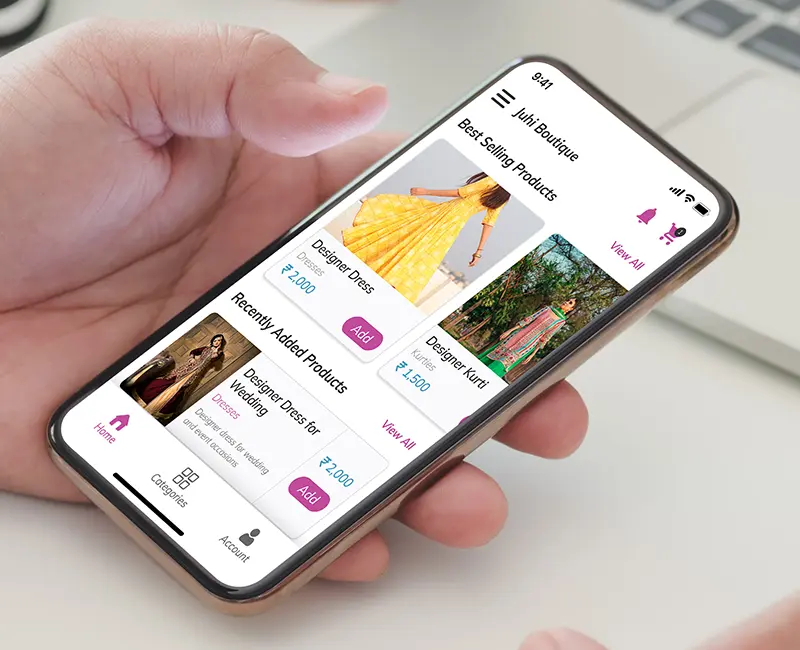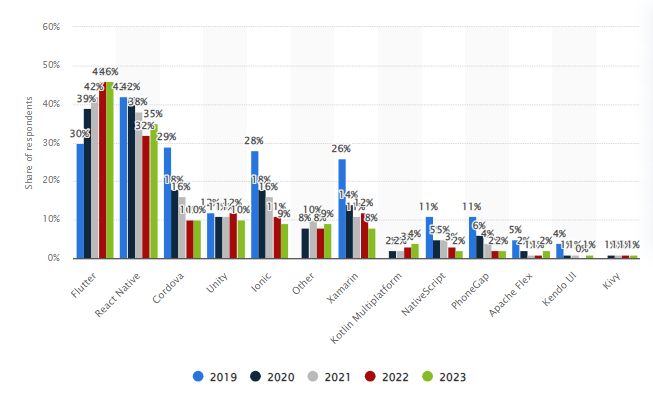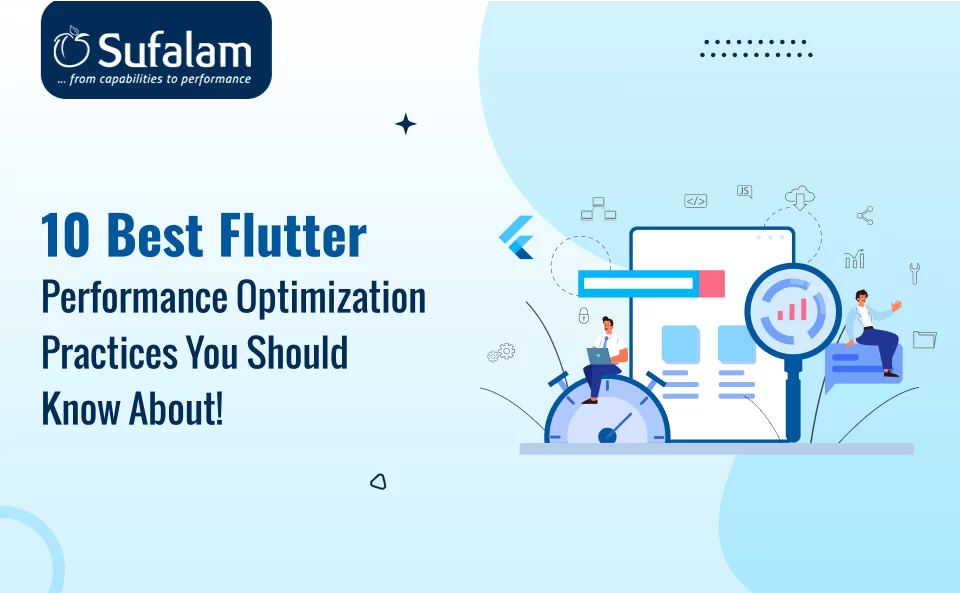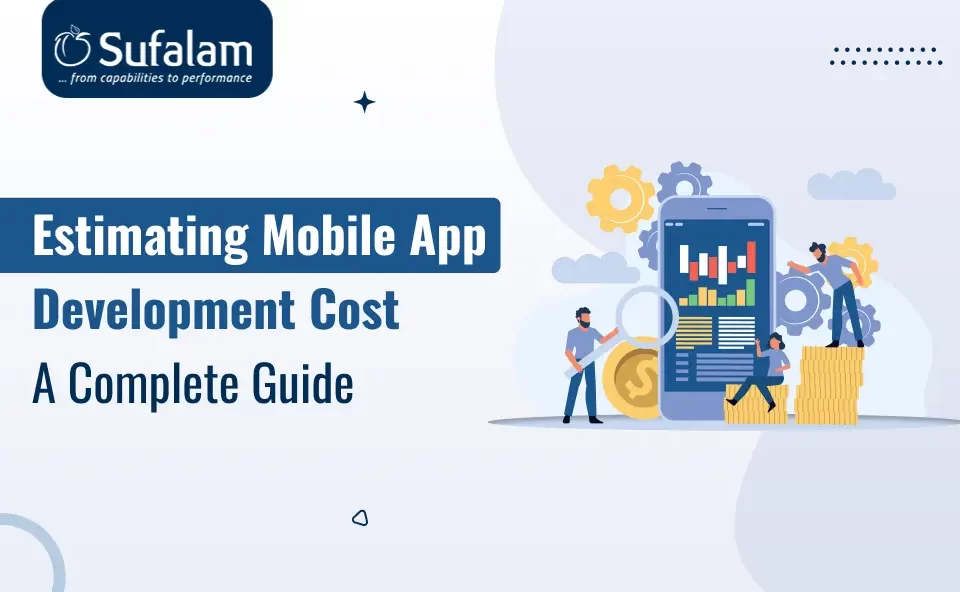Table of contents
- What is Flutter?
- Top 10 Advantages of Flutter App Development That You Shouldn’t Miss Out in 2024!
- 1. Higher Productivity
- 2. Seamless Compatibility for iOS & Android
- 3. Adaptable UI Design
- 4. Simple to Use and Learn.
- 5. Same User Interface and Business Logic
- 6. Open-Source & Robust Support
- 7. Flutter is Universally Available.
- 8. Better Rendering Engine
- 9. Top-Notch User Experience.
- 10. Easy Integrations
- To Conclude
- Frequently Asked Questions
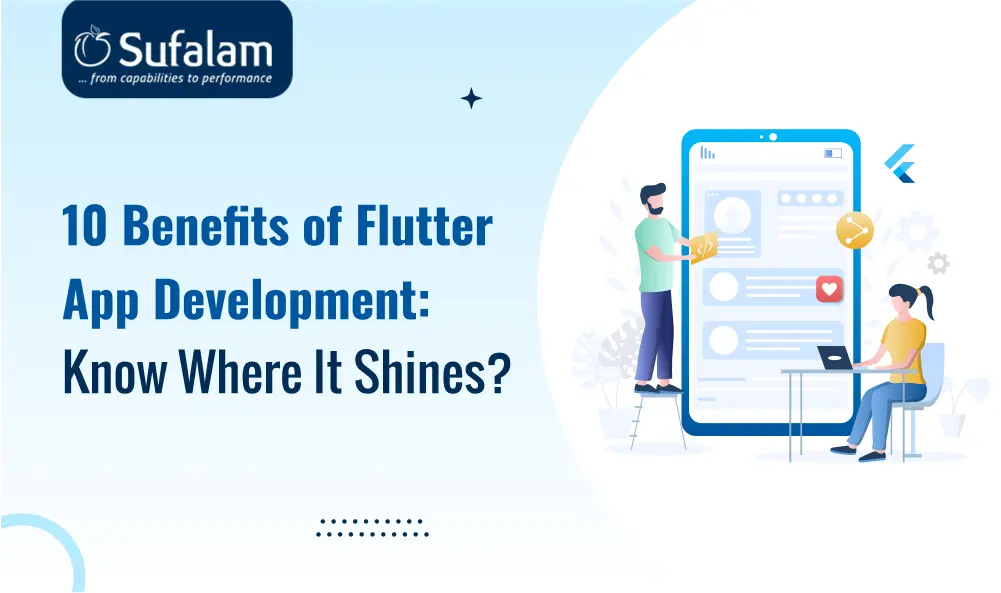
Businesses are constantly striving to stay ahead of the competition and innovate to stay ahead and fulfill the ever-changing needs of their customers.
Previously, having a user-friendly, SEO-optimized website was enough for a business to entice customers. However, as we move forward, where users spend most of their time on mobile apps, they want a user-friendly mobile application to use while on the go.
So, mobile app development has been on the rise for some time. Now, while we are discussing mobile app development - how can we forget about the Flutter framework? It is among the most popular, feature-rich, and easy-to-use frameworks for developing stunning mobile apps. Flutter is mainly popular for developing cross-platform apps.
According to Statista, Flutter is the most popular cross-platform mobile framework used by developers globally. Its appeal is more than just buzz; as it is backed up by some interesting benefits.
Let’s keep scrolling to find out the basics of Flutter and its benefits to find out why it is businesses' and developer’s favorite.
What is Flutter?
Flutter is Google's open-source, cross-platform app development framework. Using the Dart programming language enables developers to create a single codebase that can be used to create desktop, mobile, and web applications.
Based on the survey, 46% of software developers utilize Flutter to create cross-platform apps.
Flutter is a cohesive entity that provides you with a UI software development kit (SDK), as opposed to a collection of frameworks. This indicates that Flutter provides developers with all the resources and documentation required to create a working app with consistent design across all platforms.
Flutter is unique in that it uses a single codebase to create applications for multiple platforms, including Linux, Windows, macOS, Android, iOS, and even the Fuchsia web browser.
Top 10 Advantages of Flutter App Development That You Shouldn’t Miss Out in 2024!
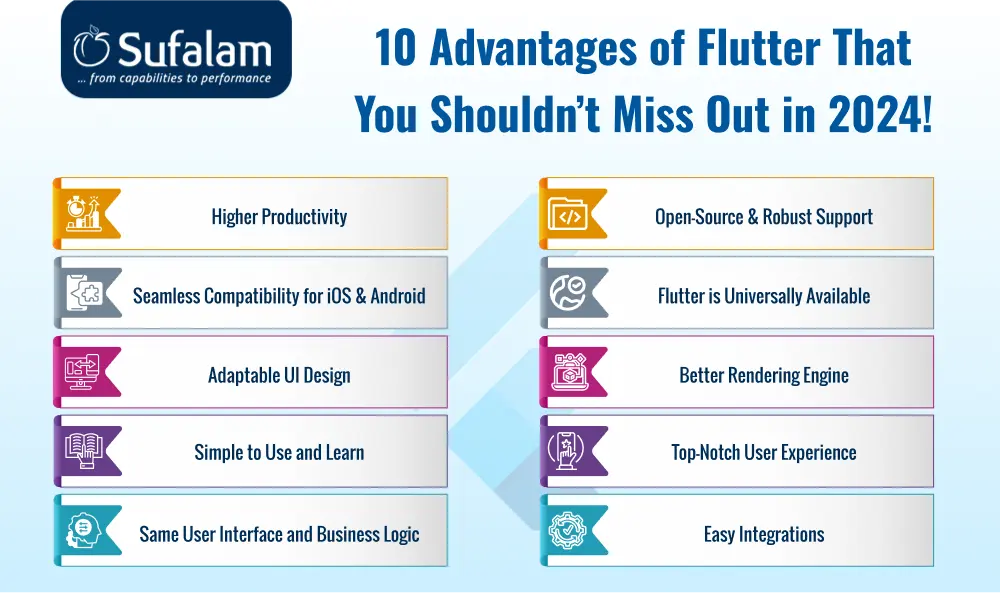
Flutter has been gaining traction since it was created to address some of the most significant issues that developers face while creating cross-platform apps. Let's dig in to learn more about the benefits of using Flutter.
1. Higher Productivity
Flutter offers great efficiency and a simplified user experience that improves an application's overall efficiency, performance, and stability because of its single codebase and native app-like performance.
It aims to give 60 frames per second (fps) or 120 fps performance, indicating increased mobile responsiveness - ensuring a better surfing experience and enhanced consumer satisfaction.
Additionally, Flutter renders the user interface and increases performance by compiling the code into native ARM machine code.
Furthermore, incorporating pre-made Flutter widgets and a robust ecosystem provides responsiveness and smooth animations.
2. Seamless Compatibility for iOS & Android
Any developer who intends to release a mobile application understands the significance of having versions for both iOS and Android.
Concentrating on developing a single native application limits the application's potential for success in the future and ignores a significant portion of the market. However, creating distinct native applications can be expensive and time-consuming.
That’s when Flutter Advantage comes into the picture because it makes cross-platform programming easier and seamless for Flutter developers. Flutter's unified codebase allows developers to leverage the single codebase for both platforms, rather than writing separate ones.
Code portability is just one aspect of Flutter's applicability for cross-platform development. Unlike other cross-platform frameworks such as React Native and Xamarin, Flutter-built user interfaces (UI) are platform-agnostic since Flutter's Skia rendering engines don't need any platform-specific UI elements.
3. Adaptable UI Design
Another well-known benefit of flutter app development is, that it makes the modification simple, even for the complex UI designs, something native platforms can't always accomplish.
For example, Flutter makes it simple to accomplish shared element changes, shape, color, and shadow manipulations, clipping, and transformations. This increases the process's versatility without increasing its workload.
Flutter's comprehensive graphics and animation libraries enable developers to create elegant, high-fidelity user interfaces that are visually attractive and provide a seamless browsing experience. Additionally, Flutter apps look fantastic on phones and tablets and can adjust to various screen sizes and aspect ratios.
Additionally, Flutter has support for 3D graphics, making it possible to generate models and 3D polygons using standard 3D tools. These can be programmed and utilized in the same way as other code components after being imported into Flutter.
4. Simple to Use and Learn.
Whether or not you have a lot of development expertise, Flutter is easy to learn. Developers who frequently work with other languages such as Java, Python, C#, or other object-oriented languages will find it easy, to include Flutter and Dart in their toolkits because Dart is architecturally and syntactically comparable to other languages.
In addition, Flutter's large widget library makes it simple to create apps without writing a lot of code for people with limited development knowledge.
There's also great documentation for Flutter. Apart from the standard reference handbook, the Flutter support materials offer a plethora of example apps, a "cookbook" that demonstrates common tasks to developers, and even a suggestion for a Flutter boot camp.
Furthermore, the widespread use of Flutter has given rise to a vibrant community that offers support and resources for beginner and seasoned Flutter developers.
5. Same User Interface and Business Logic
The ability of a cross-platform framework to create an app that looks native on all platforms may appear to be an easy process, but there is complexity involved. The majority of them depend on rendering platform-specific components, which necessitates a framework widget data synchronization and a platform-specific property mapping layer.
This affects the development process, particularly when mapping animations to platform-specific widget calls.
However, Flutter eliminates the need for platform-specific UI components when rendering the UI. All Flutter requires is a canvas to sketch on. It removes the need for additional mapping layers and streamlines the development process.
This method removes concerns about inconsistent user interfaces across platforms and streamlines the rendering process.
So, among the best Flutter benefits is it saves time and effort when you hire Flutter developers by sharing the UI and business logic without sacrificing the functionality of the finished application.
6. Open-Source & Robust Support
Among the best benefits of Flutter mobile app development is its open-source nature and robust support. Flutter's open-source nature means it's available to use and modify for free. This accessibility of Flutter for startups is quite beneficial for companies and developers who are working with limited budgets.
On top of it, Flutter is backed by support from its huge community and Google, alike. With the helpful community, you can get the resources you need to build your app and also address the problems that you are facing with utmost ease and convenience.
Furthermore, because Google backs Flutter and it relies on the framework, Flutter receives strong support from Google followed by ongoing development. Google's specialized development team responds quickly to any Flutter problems.
In addition, Google uses Flutter to create the user interface and apps for their multi-platform operating system, Google Fuchsia. This kind of commitment ensures that the Flutter framework is supported well and will continue to be relevant and supported in the future.
7. Flutter is Universally Available.
Flutter is accessible for every operating system. Therefore, unlike iOS apps, you won't have to switch to a new operating system or migrate to create apps using Flutter.
Flutter seamlessly integrates with common IDEs. There are Flutter plugins and extensions available for Android Studio, IntelliJ, and VS Code. As a result, you may manipulate Flutter commands right within the IDE rather than needing the terminal.
Android Studio requires a significant amount of computing power. Remember that Flutter is available for the web, so you can still run Flutter apps in browsers even if your laptop doesn't have 8GB of RAM. Thus, if RAM or CPU capacity is an
issue, you can test the Flutter code in your browser or as a desktop application.
Another way to create Flutter apps online in a browser is via flutlab.io, flutterflow.io, and dartpad. dev. These will come in handy because they don't need as much computer power as running Flutter on iOS or Android. To know more about how it works, you can hire the leading Flutter app development company who can better assist you.
8. Better Rendering Engine
Thanks to the render engine Skia, Flutter helps create eye-catching animations and visuals without the requirement for platform-specific user interface elements.
Flutter ensures that any application, no matter how big or complex, runs smoothly and uses the least amount of resources while ensuring a beautiful look and feel. As a result, you can employ pixels for Android and vibrant colors for iOS to create creative and appealing images for both platforms.
Furthermore, the users can leverage both iOS's human interface and Android's material design. Additionally, Flutter enables the addition of visually appealing displays and sharp graphics to apps, enhancing user interfaces and user experience.
9. Top-Notch User Experience.
Effective, eye-catching, and user-friendly user interfaces are essential for mobile apps to succeed in the real world. And in terms of creating an outstanding user experience, Flutter shines.
With Flutter's built-in widget collection, the developers can seamlessly ensure a top-notch user experience with its comprehensive set of components that enable developers to create UIs ranging from basic to sophisticated with ease.
Flutter applications are compiled straight into native code, eliminating the need for intermediate code interpretation stages. In contrast to other cross-platform development applications like React Native, which requires bridges between their code and native parts, Flutter avoids additional processing steps that reduce speed, making the whole process comparatively faster and simpler.
10. Easy Integrations
Easy and seamless integrations are at the core of the Flutter features. It helps you integrate with the existing Java, Swift, and Objective-C code without starting from scratch. It is specifically beneficial for teams that have invested heavily in native codebases, as it allows them to add new features using Flutter.
For instance, developers can incorporate Flutter modules for specific functionalities while maintaining their existing native code, ensuring a smooth transition with minimal disruption.
Additionally, Flutter supports a wide range of third-party APIs and services, to integrate the required functionalities with utmost ease.
Whether you would like to integrate Google Maps, use Firebase for backend services, or incorporate payment gateways, Flutter's extensive library of plugins makes these integrations simple. This flexibility allows developers to quickly implement complex features, enhancing their apps with advanced capabilities without having to build them from scratch.
To Conclude
After thorough research, it is clear the advantages of using Flutter for mobile app development are immense for companies and developers. It can be a game-changer for businesses that want to develop a feature-rich mobile app that is responsive, cross-platform, and tailored to end customers.
Simply put, it is a cross-platform powerhouse that says, "Write once, conquer all platforms together."
To leverage the benefits of Flutter for your business and understand more about how it can benefit you, you can reach out to leading mobile app development companies like Sufalam Technologies. Reach out to us, our team will understand your requirements and will further assist you.
So, what are you waiting for? Book a free consultation call with us, discuss your needs, and hire dedicated developers to get started.
Frequently Asked Questions
What are some of the crucial features of Flutter?
Customizable and pre-built widgets, Open-source framework, Hot reloading. Cross-platform compatibility
Is Flutter ideal for creating advanced applications?
Yes, Flutter is suitable for complex applications. It can create enterprise-level applications, e-commerce platforms, multimedia apps, and more. Its robust architecture and support for native features make it suitable for a variety of applications.




